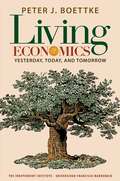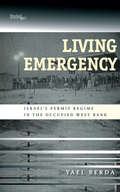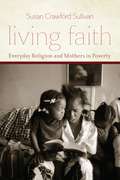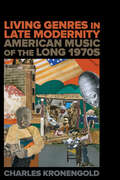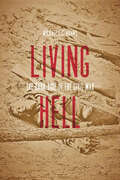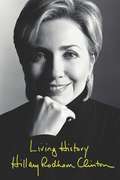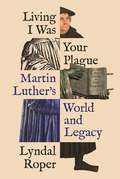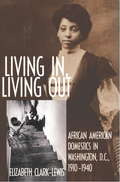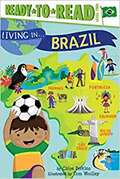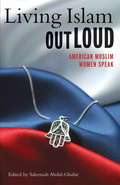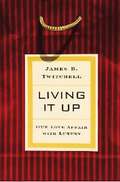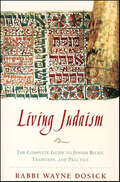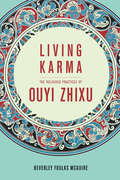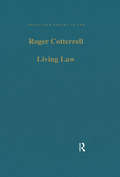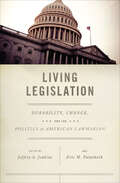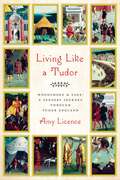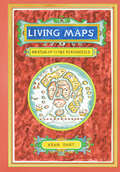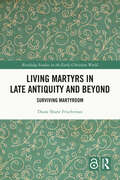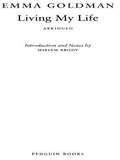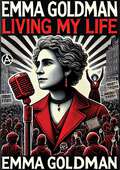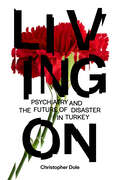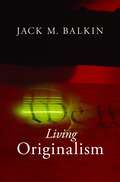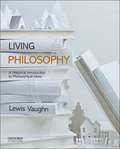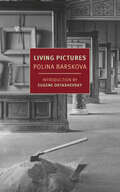- Table View
- List View
Living Economics: Yesterday, Today, and Tomorrow
by Peter J. BoettkeEconomics is not merely a game to be played by clever professionals, but a discipline that touches upon the most pressing practical issues at any historical juncture. The wealth and poverty of nations is at stake; the length and quality of life turns on the economic conditions individuals find themselves living within. Touching upon a variety of subjects—including market socialism, political economy, and economics education—this reference contains the wisdom of an expert in the field, Peter J. Boettke.The passion of the teacher is often the inspiration for a student. Living Economics illuminates how economics affects all walks of life, whether in the marketplace, voting booth, church, family, or any human activity. Boettke believes that economics is not merely a game to be played by clever professionals, but a discipline that touches on the most pressing practical issues at any historical juncture. The wealth and poverty of nations are at stake; the length and quality of life turns on the economic conditions individuals find themselves living with. So teaching and learning economics are high stakes ventures. Along the way he introduces us to major thinkers: from the Late Scholastics in 16th- and 17th-century Spain to Smith, Say, and Bastiat of the Classical School, to Austrian School scholars (Menger, Mises, Hayek, Kirzner, and Rothbard) on to New Institutional economists (Alchian, Coase, Demsetz, North, Ostrom and Williamson) and Public Choice theorists (Buchanan, Tullock, and others). This engaging and reasoned book is a must-read for economists, students, and everyone else who wishes to better understand economics. A great supplemental text for the teaching of economics, this book offers a clear perspective and a passion for a deeper understanding of the subject.
Living Emergency: Israel's Permit Regime in the Occupied West Bank
by Yael BerdaIn 1991, the Israeli government introduced emergency legislation canceling the general exit permit that allowed Palestinians to enter Israel. The directive, effective for one year, has been reissued annually ever since, turning the Occupied Territories into a closed military zone. Today, Israel's permit regime for Palestinians is one of the world's most extreme and complex apparatuses for population management. Yael Berda worked as a human rights lawyer in Jerusalem and represented more than two hundred Palestinian clients trying to obtain labor permits to enter Israel from the West Bank. With Living Emergency, she brings readers inside the permit regime, offering a first-hand account of how the Israeli secret service, government, and military civil administration control the Palestinian population. Through interviews with Palestinian laborers and their families, conversations with Israeli clerks and officials, and research into the archives and correspondence of governmental organizations, Berda reconstructs the institutional framework of the labyrinthine permit regime, illuminating both its overarching principles and its administrative practices. In an age where terrorism, crime, and immigration are perceived as intertwined security threats, she reveals how the Israeli example informs global homeland security and border control practices, creating a living emergency for targeted populations worldwide.
Living Faith: Everyday Religion and Mothers in Poverty
by Sullivan Susan CrawfordScholars have made urban mothers living in poverty a focus of their research for decades. These women’s lives can be difficult as they go about searching for housing and decent jobs and struggling to care for their children while surviving on welfare or working at low-wage service jobs and sometimes facing physical or mental health problems. But until now little attention has been paid to an important force in these women’s lives: religion. Based on in-depth interviews with women and pastors, Susan Crawford Sullivan presents poor mothers’ often overlooked views. Recruited from a variety of social service programs, most of the women do not attend religious services, due to logistical challenges or because they feel stigmatized and unwanted at church. Yet, she discovers, religious faith often plays a strong role in their lives as they contend with and try to make sense of the challenges they face. Supportive religious congregations prove important for women who are involved, she finds, but understanding everyday religion entails exploring beyond formal religious organizations. Offering a sophisticated analysis of how faith both motivates and at times constrains poor mothers’ actions, Living Faith reveals the ways it serves as a lens through which many view and interpret their worlds.
Living Genres in Late Modernity: American Music of the Long 1970s
by Charles KronengoldLiving Genres in Late Modernity rehears the American 1970s through the workings of its musical genres. Exploring stylistic developments from the late 1960s through the early 1980s, including soul, funk, disco, pop, the nocturne, and the concerto, Charles Kronengold treats genres as unstable constellations of works, people, practices, institutions, technologies, money, conventions, forms, ideas, and multisensory experiences. What these genres share is a significant cultural moment: they arrive just after "the sixties" and are haunted by a sense of belatedness, loss, or doubt, even as they embrace narratives of progress or abundance. These genres give us reasons—and means—to examine our culture’s self-understandings. Through close readings and large-scale mappings of cultural and stylistic patterns, the book’s five linked studies reveal how genres help construct personal and cultural identities that are both partial and overlapping, that exist in tension with one another, and that we experience in ebbs and flows.
Living Hell: The Dark Side of the Civil War
by Michael C. AdamsA senior military historian presents an unflinching account of the human costs of the Civil War.Many Americans, argues Michael C. C. Adams, tend to think of the Civil War as more glorious, less awful, than the reality. Millions of tourists flock to battlefields each year as vacation destinations, their perceptions of the war often shaped by reenactors who work hard for verisimilitude but who cannot ultimately simulate mutilation, madness, chronic disease, advanced physical decay. In Living Hell, Adams tries a different tack, clustering the voices of myriad actual participants on the firing line or in the hospital ward to create a virtual historical reenactment.Perhaps because the United States has not seen conventional war on its own soil since 1865, the collective memory of its horror has faded, so that we have sanitized and romanticized even the experience of the Civil War. Neither film nor reenactment can fully capture the hard truth of the four-year conflict. Living Hell presents a stark portrait of the human costs of the Civil War and gives readers a more accurate appreciation of its profound and lasting consequences.Adams examines the sharp contrast between the expectations of recruits versus the realities of communal living, the enormous problems of dirt and exposure, poor diet, malnutrition, and disease. He describes the slaughter produced by close-order combat, the difficulties of cleaning up the battlefields—where tens of thousands of dead and wounded often lay in an area of only a few square miles—and the resulting psychological damage survivors experienced.Drawing extensively on letters and memoirs of individual soldiers, Adams assembles vivid accounts of the distress Confederate and Union soldiers faced daily: sickness, exhaustion, hunger, devastating injuries, and makeshift hospitals where saws were often the medical instrument of choice. Inverting Robert E. Lee’s famous line about war, Adams suggests that too many Americans become fond of war out of ignorance of its terrors. Providing a powerful counterpoint to Civil War glorification, Living Hell echoes William Tecumseh Sherman’s comment that war is cruelty and cannot be refined.Praise for Our Masters the Rebels: A Speculation on Union Military Failure in the East, 1861–1865"This excellent and provocative work concludes with a chapter suggesting how the image of Southern military superiority endured in spite of defeat."—Civil War History"Adams's imaginative connections between culture and combat provide a forceful reminder that Civil War military history belongs not in an encapsulated realm, with its own categories and arcane language, but at the center of the study of the intellectual, social, and psychological currents that prevailed in the mid-nineteenth century."—Journal of American HistoryPraise for The Best War Ever: America and World War II"Adams has a real gift for efficiently explaining complex historical problems."—Reviews in American History"Not only is this mythologizing bad history, says Adams, it is dangerous as well. Surrounding the war with an aura of nostalgia both fosters the delusion that war can cure our social ills and makes us strong again, and weakens confidence in our ability to act effectively in our own time."—Journal of Military History
Living History
by Hillary Rodham ClintonHillary Rodham Clinton is known to hundreds of millions of people around the world. Yet few beyond her close friends and family have ever heard her account of her extraordinary journey. She writes with candor, humor and passion about her upbringing in suburban, middle-class America in the 1950s and her transformation from Goldwater Girl to student activist to controversial First Lady. Living History is her revealing memoir of life through the White House years. It is also her chronicle of living history with Bill Clinton, a thirty-year adventure in love and politics that survives personal betrayal, relentless partisan investigations and constant public scrutiny. Hillary Rodham Clinton came of age during a time of tumultuous social and political change in America. Like many women of her generation, she grew up with choices and opportunities unknown to her mother or grandmother. She charted her own course through unexplored terrain -- responding to the changing times and her own internal compass -- and became an emblem for some and a lightning rod for others. Wife, mother, lawyer, advocate and international icon, she has lived through America's great political wars, from Watergate to Whitewater. The only First Lady to play a major role in shaping domestic legislation, Hillary Rodham Clinton traveled tirelessly around the country to champion health care, expand economic and educational opportunity and promote the needs of children and families, and she crisscrossed the globe on behalf of women's rights, human rights and democracy. She redefined the position of First Lady and helped save the presidency from an unconstitutional, politically motivated impeachment. Intimate, powerful and inspiring, Living History captures the essence of one of the most remarkable women of our time and the challenging process by which she came to define herself and find her own voice -- as a woman and as a formidable figure in American politics.
Living History
by Hillary Rodham ClintonHillary Rodham Clinton is known to hundreds of millions of people around the world. Yet few beyond her close friends and family have ever heard her account of her extraordinary journey. She writes with candor, humor and passion about her upbringing in suburban, middle-class America in the 1950s and her transformation from Goldwater Girl to student activist to controversial First Lady. Living History is her revealing memoir of life through the White House years. It is also her chronicle of living history with Bill Clinton, a thirty-year adventure in love and politics that survives personal betrayal, relentless partisan investigations and constant public scrutiny. Hillary Rodham Clinton came of age during a time of tumultuous social and political change in America. Like many women of her generation, she grew up with choices and opportunities unknown to her mother or grandmother. She charted her own course through unexplored terrain -- responding to the changing times and her own internal compass -- and became an emblem for some and a lightning rod for others. Wife, mother, lawyer, advocate and international icon, she has lived through America's great political wars, from Watergate to Whitewater. The only First Lady to play a major role in shaping domestic legislation, Hillary Rodham Clinton traveled tirelessly around the country to champion health care, expand economic and educational opportunity and promote the needs of children and families, and she crisscrossed the globe on behalf of women's rights, human rights and democracy. She redefined the position of First Lady and helped save the presidency from an unconstitutional, politically motivated impeachment. Intimate, powerful and inspiring, Living History captures the essence of one of the most remarkable women of our time and the challenging process by which she came to define herself and find her own voice -- as a woman and as a formidable figure in American politics.
Living I Was Your Plague: Martin Luther's World and Legacy (The Lawrence Stone Lectures #20)
by Lyndal RoperFrom the author of the acclaimed biography Martin Luther: Renegade and Prophet, new perspectives on how Luther and others crafted his larger-than-life imageMartin Luther was a controversial figure during his lifetime, eliciting strong emotions in friends and enemies alike, and his outsized persona has left an indelible mark on the world today. Living I Was Your Plague explores how Luther carefully crafted his own image and how he has been portrayed in his own times and ours, painting a unique portrait of the man who set in motion a revolution that sundered Western Christendom.Renowned Luther biographer Lyndal Roper examines how the painter Lucas Cranach produced images that made the reformer an instantly recognizable character whose biography became part of Lutheran devotional culture. She reveals what Luther's dreams have to say about his relationships and discusses how his masculinity was on the line in his devastatingly crude and often funny polemical attacks. Roper shows how Luther's hostility to the papacy was unshaken to the day he died, how his deep-rooted anti-Semitism infused his theology, and how his memorialization has given rise to a remarkable flood of kitsch, from "Here I Stand" socks to Playmobil Luther.Lavishly illustrated, Living I Was Your Plague is a splendid work of cultural history that sheds new light on the complex and enduring legacy of Luther and his image.
Living In, Living Out
by Elizabeth Clark-LewisThis oral history portrays the lives of African American women who migrated from the rural South to work as domestic servants in Washington, DC in the early decades of the twentieth century. In Living In, Living Out Elizabeth Clark-Lewis narrates the personal experiences of eighty-one women who worked for wealthy white families. These women describe how they encountered--but never accepted--the master-servant relationship, and recount their struggles to change their status from "live in" servants to daily paid workers who "lived out."With candor and passion, the women interviewed tell of leaving their families and adjusting to city life "up North," of being placed as live-in servants, and of the frustrations and indignities they endured as domestics. By networking on the job, at churches, and at penny savers clubs, they found ways to transform their unending servitude into an employer-employee relationship--gaining a new independence that could only be experienced by living outside of their employers' homes. Clark-Lewis points out that their perseverance and courage not only improved their own lot but also transformed work life for succeeding generations of African American women. A series of in-depth vignettes about the later years of these women bears poignant witness to their efforts to carve out lives of fulfillment and dignity.
Living In...Brazil: Ready-to-read Level 2 (Living In...Series)
by Tom Woolley Chloe PerkinsJust in time for the 2016 Olympics in Rio de Janeiro, discover what it’s like growing up in Brazil with this fascinating, nonfiction Level 2 Ready-to-Read, part of a new series all about kids just like you in countries around the world! Olá! My name is Marco, and I’m a kid just like you living in Brazil. Brazil is a country filled with beautiful rain forests, bustling cities, and world-class sports. Have you ever wondered what living in Brazil is like? Come along with me to find out! Each book is narrated by a kid growing up in their home country and is filled with fresh, modern illustrations as well as loads of history, geography, and cultural goodies that fit perfectly into Common Core standards. Join kids from all over the world on a globe-trotting adventure with the Living in… series—sure to be a hit with children, parents, educators, and librarians alike!
Living Islam Out Loud
by Saleemah Abdul-GhafurLiving Islam Out Loud presents the first generation of American Muslim women who have always identified as both American and Muslim. These pioneers have forged new identities for themselves and for future generations, and they speak out about the hijab, relationships, sex and sexuality, activism, spirituality, and much more. Contributors: Su'ad Abdul-Khabeer, Sham-e-Ali al-Jamil, Samina Ali, Sarah Eltantawi, Yousra Y. Fazili, Suheir Hammad, Mohja Kahf, Precious Rasheeda Muhammad, Asra Q. Nomani, Manal Omar, Khalida Saed, Asia Sharif-Clark, Khadijah Sharif-Drinkard, Aroosha Zoq Rana, Inas Younis
Living It Up: Our Love Affair with Luxury
by James B. TwitchellEconomic downturns and terrorist attacks notwithstanding, America's love affair with luxury continues unabated. Over the last several years, luxury spending in the United States has been growing four times faster than overall spending. It has been characterized by political leaders as vital to the health of the American economy as a whole, even as an act of patriotism. Accordingly, indices of consumer confidence and purchasing seem unaffected by recession. This necessary consumption of unnecessary items and services is going on at all but the lowest layers of society: J.C. Penney now offers day spa treatments; Kmart sells cashmere bedspreads. So many products are claiming luxury status today that the credibility of the category itself is strained: for example, the name "pashmina" had to be invented to top mere cashmere.We see luxury everywhere: in storefronts, advertisements, even in the workings of our imaginations. But what is it? How is it manufactured on the factory floor and in the minds of consumers? Who cares about it and who buys it? And how concerned should we be that luxuries are commanding a larger and larger percentage of both our disposable income and our aspirations?Trolling the upscale malls of America, making his way toward the Mecca of Las Vegas, James B. Twitchell comes to some remarkable conclusions. The democratization of luxury, he contends, has been the single most important marketing phenomenon of our times. In the pages of Living It Up, Twitchell commits the academic heresy of paying respect to popular luxury consumption as a force that has united the country and the globe in a way that no war, movement, or ideology ever has. What's more, he claims, the shopping experience for Americans today has its roots in the spiritual, the religious, and the transcendent.Deft and subtle writing, audacious ideas, and a fine sense of humor inform this entertaining and insightful book.
Living Judaism: The Complete Guide to Jewish Belief, Tradition, and Practice
by Wayne D. DosickIn Living Judaism, Rabbi Wayne Dosick, Ph.D., author the acclaimed Golden Rules, Dancing with God, and When Life Hurts, offers an engaging and definitive overview of Jewish philosophy and theology, rituals and customs. Combining quality scholarship and sacred spiritual instruction, Living Judaism is a thought-provoking reference and guide for those already steeped in Jewish life, and a comprehensive introduction for those exploring the richness and grandeur of Judaism.
Living Karma: The Religious Practices of Ouyi Zhixu (The Sheng Yen Series in Chinese Buddhist Studies)
by Beverley McGuireOuyi Zhixu (1599–1655) was an eminent Chinese Buddhist monk who, contrary to his contemporaries, believed karma could be changed. Through vows, divination, repentance rituals, and ascetic acts such as burning and blood writing, he sought to alter what others understood as inevitable and inescapable. Drawing attention to Ouyi's unique reshaping of religious practice, Living Karma reasserts the significance of an overlooked individual in the modern development of Chinese Buddhism.While Buddhist studies scholarship tends to privilege textual analysis, Living Karma promotes a balanced study of ritual practice and writing, treating Ouyi's texts as ritual objects and his reading and writing as religious acts. Each chapter addresses a specific religious practice—writing, divination, repentance, vows, and bodily rituals—offering first a diachronic overview of each practice within the history of Chinese Buddhism and then a synchronic analysis of each phenomenon through close readings of Ouyi's work. This book sheds much-needed light on a little-known figure and his representation of karma, which proved to be a seminal innovation in the religious thought of late imperial China.
Living Law: Studies in Legal and Social Theory (Collected Essays In Law Ser.)
by Roger CotterrellLiving Law presents a comprehensive overview of relationships between legal and social theory, and of current approaches to the sociological study of legal ideas. It explores the nature of legal theory and sociolegal studies today as teaching and research fields, and the work of many of the major sociolegal theorists. In addition, it sets out the author's distinctive approach to sociological analysis of law, applying this in a range of studies in specific legal fields, such as the law of contract, property and trusts, constitutional analysis, and comparative law.
Living Legislation: Durability, Change, and the Politics of American Lawmaking
by William J. Novak Jeffrey E. Cohen David R. Mayhew William G. Howell Forrest Maltzman Matthew Eshbaugh-Soha Barry C. Burden Vesla M. Weaver Stuart Chinn Sidney M. Milkis Amihai Glazer Sean Gailmard David E. Lewis Charles R. Shipan Christopher R. BerryPolitical scholars examine the dynamic evolution of laws over time in a volume that &“pushes the frontiers of knowledge about lawmaking in the US&” (Choice). Politics is at its most dramatic during debates over important pieces of legislation. And while debates over legislative measures can rage for years or even decades before an item is enacted, they also endure long afterward, when the political legacy of a law eventually comes into focus. With a diverse set of contributors—including quantitative political scientists, political development scholars, historians, and economists—Living Legislation provides fresh insights into contemporary American politics and public policy. Many of the contributors to this volume focus on the question of why some laws stand the test of time while others are eliminated, replaced, or significantly amended. Others discuss how laws emerge from—and effect change within—coalition structures; the effectiveness of laws at mediating partisan conflicts; and the ways in which laws interact with broader shifts in the political environment. An essential addition to the study of politics, Living Legislation enhances understanding of democracy, governance, and power.
Living Like a Tudor: Woodsmoke and Sage: A Sensory Journey Through Tudor England
by Amy LicenceTake a 500-year journey back in time and experience the Tudor Era through the five senses.Much has been written about the lives of the Tudors, but it is sometimes difficult to really grasp how they experienced the world. Using the five senses, Amy Licence presents a new perspective on the material culture of the past, exploring the Tudors&’ relationship with the fabric of their existence, from the clothes on their back, roofs over their heads and food on their tables, to the wider questions of how they interpreted and presented themselves, and beliefs about life, death and beyond. This book helps recapture the past: what were the Tudors&’ favorite perfumes? How did the weather affect their lives? What sounds from the past have been lost? Take a journey back 500 years, to experience the Tudor world as closely as possible, through sights, sound, smell, taste and touch.
Living Maps: An Atlas of Cities Personified
by Adam DantVenture to twenty-eight cities around the world in this colorfully illustrated collection of maps that take you on a journey through history, culture, and geography.On each page, you’ll visit a different city. And in each city, you’ll explore the metaphorical resonance between the physical metropolis and its inhabitants, history, and culture. In the hands of a creative cartographer, Manhattan is dissected in an anatomical diagram, the streets of Monaco trace the form of a Picasso nude, and the crisscrossing paths of boats on the Bosphorus become the nerves of Istanbul.Travel as you never have traveled before, and revel in the details that define urban life. By laying bare the bone, muscle, and sinew of twenty-eight cities, these maps reveal the unique spirit of each one and shed light on the strange and marvelous ways in which humans interact with the places they call home.Witty and insightful, this book will capture the imaginations of travelers, map enthusiasts, history buffs, and dreamers.
Living Martyrs in Late Antiquity and Beyond: Surviving Martyrdom (Routledge Studies in the Early Christian World)
by Diane Shane FruchtmanThis book demonstrates that living martyrdom was an important spiritual aspiration in the late antique Latin west and argues that, consequently, attempts to define, study, or locate martyrdom must move away from conceptualizations that require or center on death. After an introduction that traces the persistence of "living martyrs" as real objects of spiritual devotion and emulation across the span of Christian history and discusses why such martyrs have been overlooked, the book focuses on three significant authors from the late ancient Latin west for whom martyrdom did not require death: the Spanish poet Prudentius (c. 348–413), the senator-turned-ascetic Paulinus of Nola (353–431), and the influential North African bishop Augustine of Hippo (354–430). Through historically and literarily contextualized close readings of their work, this book shows that each of these three authors attempted to create a new paradigm of martyrdom focused on living, rather than dying, for God. By focusing on these living martyrs, we are able to see more clearly the aspirations and agendas of those who promoted them as martyrs and how their martyrological discourse illuminates the variety of ways that martyrdom is and can be mobilized (in any era) to construct new, community-creating worldviews. Living Martyrs in Late Antiquity and Beyond is an important resource for historians of Christianity, scholars of religious studies, and anyone interested in exploring or understanding martyrological discourse. The Introduction of this book is available for free in PDF format as Open Access from the individual product page at www.routledge.com. It has been made available under a Creative Commons Attribution-Non Commercial-No Derivatives 4.0 license.
Living My Life
by Emma GoldmanAnarchist, journalist, drama critic, advocate of birth control and free love, Emma Goldman was the most famous—and notorious—woman in the early twentieth century. This abridged version of her two-volume autobiography takes her from her birthplace in czarist Russia to the socialist enclaves of Manhattan’s Lower East Side. Against a dramatic backdrop of political argument, show trials, imprisonment, and tempestuous romances, Goldman chronicles the epoch that she helped shape: the reform movements of the Progressive Era, the early years of and later disillusionment with Lenin’s Bolshevik experiment, and more. Sounding a call still heard today, Living My Life is a riveting account of political ferment and ideological turbulence. First time in Penguin Classics Condensed to half the length of Goldman's original work, this edition is accessible to those interested in the activist and her extraordinary era .
Living My Life: The Autobiography of a Social Activist, Women’s Rights Campaigner and Political Philosopher
by Emma GoldmanStep into the passionate and tumultuous world of one of history's most iconic anarchists with Emma Goldman’s powerful autobiography, "Living My Life." This riveting two-volume memoir offers an unflinching account of Goldman's life, from her early years in Russia to her rise as a leading figure in the anarchist movement in the United States and beyond.Emma Goldman, renowned for her fiery oratory and uncompromising activism, provides a deeply personal narrative that intertwines her political beliefs with her personal experiences. "Living My Life" chronicles her relentless fight for social justice, free speech, and workers' rights, painting a vivid picture of her involvement in pivotal historical events, including the Haymarket affair, the rise of the labor movement, and the fight for women's emancipation.Through Goldman's eloquent prose, readers gain insight into the challenges and triumphs she faced as a radical thinker and activist. She candidly discusses her relationships, her encounters with prominent figures like Alexander Berkman and Peter Kropotkin, and her multiple imprisonments and deportations. Goldman's reflections on her life's work provide a poignant look at the sacrifices and resilience required to pursue a vision of a more equitable world."Living My Life" is not just a historical document but also a testament to the enduring spirit of resistance and the quest for freedom. Goldman's narrative is imbued with a profound sense of humanity, capturing her unwavering dedication to her principles and her unyielding belief in the power of individual and collective action.This autobiography is essential reading for anyone interested in the history of social movements, anarchism, and feminist thought. Emma Goldman's "Living My Life" remains a compelling and inspirational work that continues to resonate with readers seeking to understand the complexities of social change and the indomitable will of those who fight for it. Immerse yourself in Emma Goldman’s extraordinary journey and discover the life of a woman who defied conventions, challenged injustices, and left an indelible mark on the world.
Living On: Psychiatry and the Future of Disaster in Turkey
by Christopher T. DoleLiving On centers around the unprecedented mobilization of mental health professionals in the wake of a massive earthquake that struck western Turkey in 1999—a disaster that left more than 20,000 people dead and hundreds of thousands of residents displaced. Working amid unimaginable destruction and suffering, volunteer psychiatrists and psychologists would quickly improvise a makeshift response, offering thousands of survivors access to psychiatric care for the first time. Never before had there been such a collective expression of concern for people's psychological well-being. Christopher Dole explores how this psychiatric response fashioned individual and collective lives far into the disaster's future. Based on research spanning two decades, from the earthquake to its twentieth anniversary, he considers how this convergence of geological activity and psychiatric expertise introduced novel psychiatric and psychological discourses into everyday lives of survivors, as it also animated new visions of self, society, and technopolitical promise. Living On not only offers insight into Turkey's transformations over the opening decades of the twenty-first century, but it also sheds light on a more general arrangement of disaster, governance, and medical expertise—one that increasingly characterizes our era of planetary ecological crisis.
Living Originalism
by Jack M. BalkinOriginalism and living constitutionalism, so often understood to be diametrically opposing views of our nation’s founding document, are not in conflict—they are compatible. So argues Jack Balkin, one of the leading constitutional scholars of our time, in this long-awaited book. Step by step, Balkin gracefully outlines a constitutional theory that demonstrates why modern conceptions of civil rights and civil liberties, and the modern state’s protection of national security, health, safety, and the environment, are fully consistent with the Constitution’s original meaning. And he shows how both liberals and conservatives, working through political parties and social movements, play important roles in the ongoing project of constitutional construction. By making firm rules but also deliberately incorporating flexible standards and abstract principles, the Constitution’s authors constructed a framework for politics on which later generations could build. Americans have taken up this task, producing institutions and doctrines that flesh out the Constitution’s text and principles. Balkin’s analysis offers a way past the angry polemics of our era, a deepened understanding of the Constitution that is at once originalist and living constitutionalist, and a vision that allows all Americans to reclaim the Constitution as their own.
Living Philosophy: A Historical Introduction to Philosophical Ideas
by Lewis VaughnThis second edition of Living Philosophy guides students in a survey of the historical march of philosophical ideas, encouraging an appreciation of the significance of these ideas in Western and Eastern thought. Living Philosophy provides this guidance in five fundamental ways: it tells a coherent story of philosophical thought from the pre-Socratics to the present; it provides the cultural and intellectual background for this story; it explains why the major issues and arguments are important and relevant today; it includes substantial, well-chosen excerpts from the philosophers' works; and it presents all these elements in a way that engages and stimulates student interest and understanding. Living Philosophy includes solid coverage of critical-thinking skills and argument basics as well as practice in reading philosophical works. Students learn how to do philosophy--to think and write philosophically--when they get encouragement and practice in analyzing and critiquing their own views as well as those philosophers they study. To this end, Living Philosophy emphasizes philosophical writing, reinforced with step-by-step coaching in how to write argumentative essays on philosophical topics and supported by multiple opportunities to hone basic skills. Living Philosophy further engages today's learners with abundant illustrations and graphics; marginal glosses, questions, and quotations; profiles of a diverse array of philosophers; and ample representation of non-Western and nontraditional sources and voices.
Living Pictures
by Polina BarskovaA poignant collection of short pieces about the author's hometown, St. Petersburg, Russia, and the siege of Leningrad that combines memoir, history, and fiction.Living Pictures refers to the parlor game of tableaux vivants, in which people dress up in costume to bring scenes from history back to life. It&’s a game about survival, in a sense, and what it means to be a survivor is the question that Polina Barskova explores in the scintillating literary amalgam of Living Pictures. Barskova, one of the most admired and controversial figures in a new generation of Russian writers, first made her name as a poet; she is also known as a scholar of the catastrophic siege of Leningrad in World War II. In Living Pictures, Barskova writes with caustic humor and wild invention about traumas past and present, historical and autobiographical, exploring how we cope with experiences that defy comprehension. She writes about her relationships with her adoptive father and her birth father; about sex, wanted and unwanted; about the death of a lover; about Turner and Picasso; and, in the final piece, she mines the historical record in a chamber drama about two lovers sheltering in the Hermitage Museum during the siege of Leningrad who slowly, operatically, hopelessly, stage their own deaths.Living Pictures introduces a startlingly daring and original new voice from world literature.
